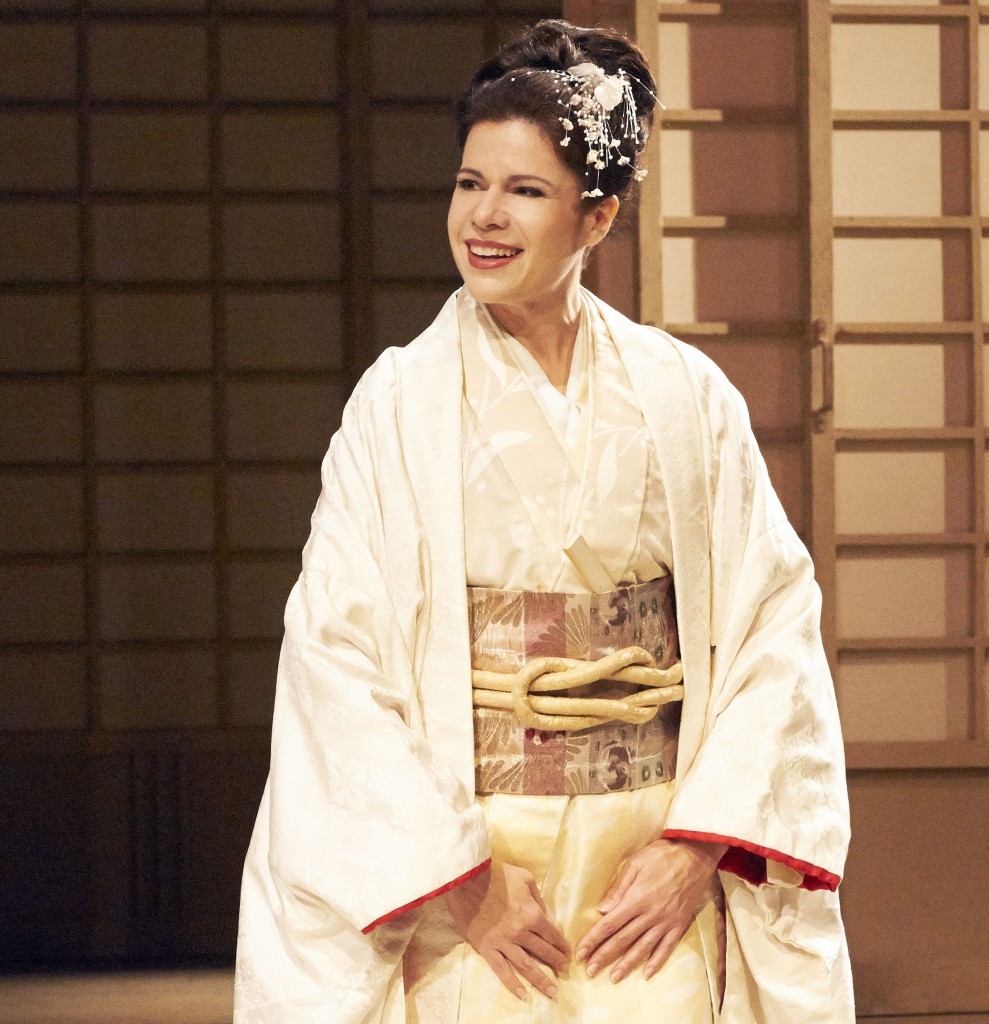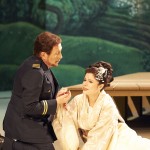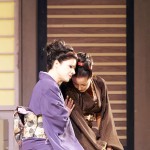 Puccini’s Madama Butterfly premiered in 1904, its appeal undiminished. Is it the the exoticism, the authentic detail stemming from Puccini’s interest in Japan: or the tragic love story inspiring Puccini’s ravishing music? Madama Butterfly is as relevant now as a parable of imperialism, Cio-Cio-San the victim of Lieutenant Pinkerton of the US Navy. (He rents a house, marries his temporary wife in Japan- against the advice of her maid, Japanese house owner, and US Consul.) The tragedy is Cio-Cio-San’s, who, in her innocent trust, sacrifices everything for Pinkerton, even converts to his religion.
Puccini’s Madama Butterfly premiered in 1904, its appeal undiminished. Is it the the exoticism, the authentic detail stemming from Puccini’s interest in Japan: or the tragic love story inspiring Puccini’s ravishing music? Madama Butterfly is as relevant now as a parable of imperialism, Cio-Cio-San the victim of Lieutenant Pinkerton of the US Navy. (He rents a house, marries his temporary wife in Japan- against the advice of her maid, Japanese house owner, and US Consul.) The tragedy is Cio-Cio-San’s, who, in her innocent trust, sacrifices everything for Pinkerton, even converts to his religion.
It is surely a tale of sex-tourism , with the westerner – wishful thinking, sincere- exploiting the good faith of his hosts, with Cio-Cio-San duped into marrying him. Meanwwhile with the US Consul, Pinkerton drinks to America, his home ties and an American wife.
At Vienna State Opera, Pinkerton, sung by a very Italian looking Neil Shicoff, (youthfully black hair, moustachioed) boasts to Sharpless, the US Consul (Gabriel Bermudez): Everywhere in the world, the roaming Yankee gets his money’s worth. He, the American sailor, drops anchor until a storm ravages the ship. But this ‘easy-going greed’ saddens him. Puccini’s aria, infused with strains of the stars- and-stripes, is adequately sung by an unrecognisably off-form Shicoff, his tenor lustreless, his range lacking. When his bride to be, Cio-Cio-San , is ready ‘like a garland of flowers’, Pinkerton admits to Sharpless- ‘I don’t know if it is love or a passing fancy.’ Introducing the butterfly trope, Pinkerton sings ‘She is like a butterfly. He only has to catch her even if it breaks her wings’- an ominous statement of his power over her. (Shicoff, not inspiring, makes hard work of it.) When he raises a toast it’s to marriage to ‘a real American girl’.
For the wedding Cio-Cio-San appears in white silk heading the Geisha girls.(The gowns are authentic kimonos.) Ana Maria Martinez’s voice, a light soprano, endears her in its fragility, sings before she crosses the bridge she must turn back and look at the things dear to her. The bridge is also symbolic -apart from the customary marriage crossing to her husband- in cultural terms. Marrying Pinkerton, she’s ‘burning her bridges’, cutting off her family.
Cio-Cio-San, ‘Butterfly’, sings of how she had to make her life as a geisha, of hard times :’The storm breaks even the strongest pines.’ Her mother, a noble lady, is now poor. And it’s revealed Butterfly is only 15 -years- old (carrying other implications). The other girls sing, he (Pinkerton) is ‘as handsome as a dream: he’ll divorce her.’
Butterfly shows Pinkerton her make up box; something sacred, a present from the Mikado to her father; and the dolls, the souls of her ancestors. But -to underline her sacrifice, her alienation from her roots- sings how she went secretly to the Mission, to adapt to the new religion. ‘Her uncle (a Buddhist Priest) knows nothing: she will follow his (Pinkerton’s) God. ‘For you I am prepared to forget my own religion, my nearest and dearest.’
Yet Pinkerton is insensitive, after the ceremony sings arrogantly, ‘Now I am a family , let’s get rid of these people.’ (She’s his legally to have.) Her Uncle Bonze arrives- he will spoil the celebrations, they murmur- reproaches her, she was seen at the Mission: ‘Your soul is lost.’ Disrespectfully to a Priest, Pinkerton tells him to get out -will not tolerate shouting in his house.
 In the opening of their extended duet, he sings to her ‘Don’t cry little girl, your relatives aren’t worth it!’ Beneath Puccini’s rapturous music -one of the great love duets in opera- there’s a seduction scene. She sings, his words touch her heart: they repeatedly, the refrain Viene la sera (evening is coming). They’re swept along irreversibly. The bride is dressed in white. He’s transported by a sudden desire: Dear child with wonderful eyes, you are all mine.
In the opening of their extended duet, he sings to her ‘Don’t cry little girl, your relatives aren’t worth it!’ Beneath Puccini’s rapturous music -one of the great love duets in opera- there’s a seduction scene. She sings, his words touch her heart: they repeatedly, the refrain Viene la sera (evening is coming). They’re swept along irreversibly. The bride is dressed in white. He’s transported by a sudden desire: Dear child with wonderful eyes, you are all mine.
For her, he’s the star of her firmament. (But she’s barely a girl, infatuated with the experienced older man.) She’s sitting on her knees before him (Shicoff sitting on the well side stage.) ‘They say in your country butterflies are pinned to a board.’ He replies, so they will no longer escape. Again ‘The night is for love’, she sings his refrain, ‘Do not be afraid, be mine!’
Act 2 in Butterfly’s house – Tsugouharu Foujita’s set authentically designed- witnesses the consequences of her abandonment. Yet her trust for him is unflinching. ‘Japanese girls are lazy’, she sings, convincing herself of the superiority of the American God , and way of life. She gives Suzuki (Alisa Kolosova) her last ; they’ve been spending too much. (Why didn’t Pinkerton provide for his wife?) For Pinkerton, the house is an investment. But she asks, why did he have the house filled with locks? ‘He wants to keep trouble outside’ she sings.
Suzuki repeatedly reminds her of the harsh realities: no foreign husband has ever returned. And is rebuked. (‘He promised to return when the robins are building their nests.’)
Ana Martinez is appealing, though her soprano lacks real power- charming as should be. ‘My little wife’, he’ll call her- the aria (un bel di) doesn’t quite sweep you away, Martinez underpowered against the orchestral climaxes, Vienna State Opera Orchestra inspired by no less than Placido Domingo on conductor’s rostrum.
The visit from the Consul, bearing Pinkerton’s letter is crucial, a testimony of Pinkerton’s real intent. ‘My friend’, Sharpless reads to her, ‘will you visit the pretty widow… And if she still loves me prepare her.’ At this point Sharpless falters, unable to continue- very movingly rendered by Gabriel Bermudez. What would she do if he never comes back? She’d delight people with her singing. Then, ‘I thought I would die: has he forgotten me?’ She shows him her son. ‘Have you ever seen a child in Japan with blue eyes?’ (What happens to such children , we wonder, alienated, they belong in neither culture.) Butterfly wanted to call Pinkerton for help, is even prepared to beg to provide for him. Visibly shaken- Bermudez a sympathetic figure in a sobre black suit- -‘His father (Pinkerton ) will hear of this, I promise you!’  (Sharpless witholds news of Pinkerton’s American marriage. So Butterfly rejects Japanese suitors, decorates her house sure of Pinkerton’s return.) Exquisitely scored , Act II is characterised by wistful melancholy, one of waiting , frustration. But Martinez as Butterfly doesn’t have, for me, an interesting enough voice to carry this long Act. She’s pleasant, but lacking at crucial moments.
(Sharpless witholds news of Pinkerton’s American marriage. So Butterfly rejects Japanese suitors, decorates her house sure of Pinkerton’s return.) Exquisitely scored , Act II is characterised by wistful melancholy, one of waiting , frustration. But Martinez as Butterfly doesn’t have, for me, an interesting enough voice to carry this long Act. She’s pleasant, but lacking at crucial moments.
The ship sighted, Pinkerton finally arrives. In his meeting with Sharpless, he appears callous . ‘She will realise the truth better if she comes face to face with it.’ He was warned, insists Sharpless. The Consul had told him to be careful, but he wouldn’t listen. ‘She believed you.’ Now Pinkerton is filled with remorse, sees the mistake he made which, he sings, will torment him forever (will never forget his blossom).
Mrs Pinkerton appears, (Simina Ivan) tall, blonde, elegant in a striking hat, fin-de-siecle costume. ‘That woman- what does she want of me?- is like a blow to her heart. But Pinkerton, insists, she is not to blame for her suffering. And withdraws.
Sharpless introduces Pinkerton’s wife: Pinkerton will never return. The confrontation between American wife- albeit gentle, sympathetic- and the manipulated Butterfly is shocking. And Pinkerton’s belated remorse is not quite convincing (Shicoff’s tenor surprisingly lacking in ballast.)
‘Unhappy mother to give up her son!’ Butterfly is dignified, calm. Honour demands her ritual suicide. The tragic denoument -Butterfly’s impassioned farewell (O a me, sceso dal trano) -cannot fail to move. For all the sumptuous high-romanticism of Puccini’s score, we should never forget -beneath the decorative gloss- the tawdry story of a woman’s exploitation. P.R. 19.11.2013
Photos: Ana Maria Martinez (Cio-Cio-San); Neil Shicoff (Pinkerton) and Ana Maria Martinez (Cio-Cio-San); Ana Maria Martinez and Alisa Kolosova (Suzuki)
(c) Wiener Staatsoper / Michael Poehn
viennaoperareview.com
Vienna's English opera blog
